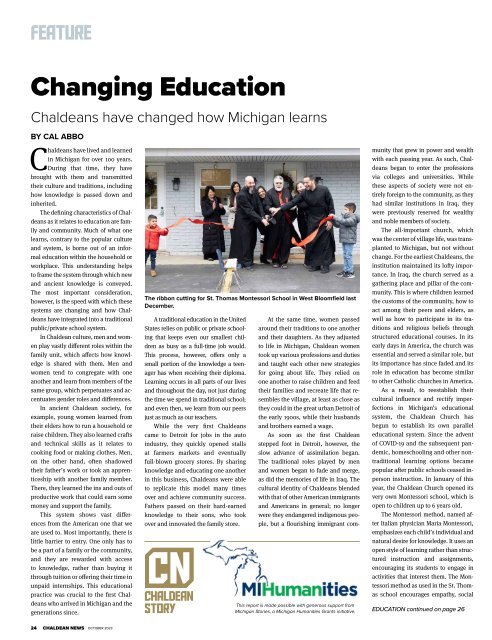You also want an ePaper? Increase the reach of your titles
YUMPU automatically turns print PDFs into web optimized ePapers that Google loves.
FEATURE<br />
Changing Education<br />
Chaldeans have changed how Michigan learns<br />
BY CAL ABBO<br />
Chaldeans have lived and learned<br />
in Michigan for over 100 years.<br />
During that time, they have<br />
brought with them and transmitted<br />
their culture and traditions, including<br />
how knowledge is passed down and<br />
inherited.<br />
The defining characteristics of Chaldeans<br />
as it relates to education are family<br />
and community. Much of what one<br />
learns, contrary to the popular culture<br />
and system, is borne out of an informal<br />
education within the household or<br />
workplace. This understanding helps<br />
to frame the system through which new<br />
and ancient knowledge is conveyed.<br />
The most important consideration,<br />
however, is the speed with which these<br />
systems are changing and how Chaldeans<br />
have integrated into a traditional<br />
public/private school system.<br />
In Chaldean culture, men and women<br />
play vastly different roles within the<br />
family unit, which affects how knowledge<br />
is shared with them. Men and<br />
women tend to congregate with one<br />
another and learn from members of the<br />
same group, which perpetuates and accentuates<br />
gender roles and differences.<br />
In ancient Chaldean society, for<br />
example, young women learned from<br />
their elders how to run a household or<br />
raise children. They also learned crafts<br />
and technical skills as it relates to<br />
cooking food or making clothes. Men,<br />
on the other hand, often shadowed<br />
their father’s work or took an apprenticeship<br />
with another family member.<br />
There, they learned the ins and outs of<br />
productive work that could earn some<br />
money and support the family.<br />
This system shows vast differences<br />
from the American one that we<br />
are used to. Most importantly, there is<br />
little barrier to entry. One only has to<br />
be a part of a family or the community,<br />
and they are rewarded with access<br />
to knowledge, rather than buying it<br />
through tuition or offering their time in<br />
unpaid internships. This educational<br />
practice was crucial to the first Chaldeans<br />
who arrived in Michigan and the<br />
generations since.<br />
The ribbon cutting for St. Thomas Montessori School in West Bloomfield last<br />
December.<br />
A traditional education in the United<br />
States relies on public or private schooling<br />
that keeps even our smallest children<br />
as busy as a full-time job would.<br />
This process, however, offers only a<br />
small portion of the knowledge a teenager<br />
has when receiving their diploma.<br />
Learning occurs in all parts of our lives<br />
and throughout the day, not just during<br />
the time we spend in traditional school;<br />
and even then, we learn from our peers<br />
just as much as our teachers.<br />
While the very first Chaldeans<br />
came to Detroit for jobs in the auto<br />
industry, they quickly opened stalls<br />
at farmers markets and eventually<br />
full-blown grocery stores. By sharing<br />
knowledge and educating one another<br />
in this business, Chaldeans were able<br />
to replicate this model many times<br />
over and achieve community success.<br />
Fathers passed on their hard-earned<br />
knowledge to their sons, who took<br />
over and innovated the family store.<br />
CHALDEAN<br />
STORY<br />
At the same time, women passed<br />
around their traditions to one another<br />
and their daughters. As they adjusted<br />
to life in Michigan, Chaldean women<br />
took up various professions and duties<br />
and taught each other new strategies<br />
for going about life. They relied on<br />
one another to raise children and feed<br />
their families and recreate life that resembles<br />
the village, at least as close as<br />
they could in the great urban Detroit of<br />
the early 1900s, while their husbands<br />
and brothers earned a wage.<br />
As soon as the first Chaldean<br />
stepped foot in Detroit, however, the<br />
slow advance of assimilation began.<br />
The traditional roles played by men<br />
and women began to fade and merge,<br />
as did the memories of life in Iraq. The<br />
cultural identity of Chaldeans blended<br />
with that of other American immigrants<br />
and Americans in general; no longer<br />
were they endangered indigenous people,<br />
but a flourishing immigrant community<br />
that grew in power and wealth<br />
with each passing year. As such, Chaldeans<br />
began to enter the professions<br />
via colleges and universities. While<br />
these aspects of society were not entirely<br />
foreign to the community, as they<br />
had similar institutions in Iraq, they<br />
were previously reserved for wealthy<br />
and noble members of society.<br />
The all-important church, which<br />
was the center of village life, was transplanted<br />
to Michigan, but not without<br />
change. For the earliest Chaldeans, the<br />
institution maintained its lofty importance.<br />
In Iraq, the church served as a<br />
gathering place and pillar of the community.<br />
This is where children learned<br />
the customs of the community, how to<br />
act among their peers and elders, as<br />
well as how to participate in its traditions<br />
and religious beliefs through<br />
structured educational courses. In its<br />
early days in America, the church was<br />
essential and served a similar role, but<br />
its importance has since faded and its<br />
role in education has become similar<br />
to other Catholic churches in America.<br />
As a result, to reestablish their<br />
cultural influence and rectify imperfections<br />
in Michigan’s educational<br />
system, the Chaldean Church has<br />
begun to establish its own parallel<br />
educational system. Since the advent<br />
of COVID-19 and the subsequent pandemic,<br />
homeschooling and other nontraditional<br />
learning options became<br />
popular after public schools ceased inperson<br />
instruction. In January of this<br />
year, the Chaldean Church opened its<br />
very own Montessori school, which is<br />
open to children up to 6 years old.<br />
The Montessori method, named after<br />
Italian physician Maria Montessori,<br />
emphasizes each child’s individual and<br />
natural desire for knowledge. It uses an<br />
open style of learning rather than structured<br />
instruction and assignments,<br />
encouraging its students to engage in<br />
activities that interest them. The Montessori<br />
method as used in the St. Thomas<br />
school encourages empathy, social<br />
This report is made possible with generous support from<br />
Michigan Stories, a Michigan Humanities Grants initiative. EDUCATION continued on page 26<br />
24 CHALDEAN NEWS <strong>OCTOBER</strong> <strong>2023</strong>

















